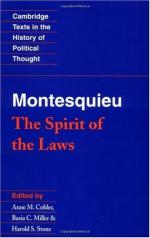|
This section contains 9,146 words (approx. 31 pages at 300 words per page) |

|
SOURCE: Cohler, Anne M. “Liberty.” In Montesquieu's Comparative Politics and the Spirit of American Constitutionalism, pp. 98-119. Lawrence: University Press of Kansas, 1988.
In this excerpt from her study of Montesquieu's influence on American politics, Cohler relates Montesquieu's idea of liberty to the structure of the American federal government and the doctrine of the separation of powers. Cohler also emphasizes Montesquieu's belief that not all citizens were equally able to possess liberty, noting his aristocratic sympathies.
We have been taught that political liberty, as the end of political life, is a result of the view that men are by nature equal and that this equality gives them the same rights to life, to liberty, and to the pursuit of the ends implied by liberty, whether those ends are expressed in terms of property or of happiness. Governments are instituted to keep these human entities from bumping into each other...
|
This section contains 9,146 words (approx. 31 pages at 300 words per page) |

|


